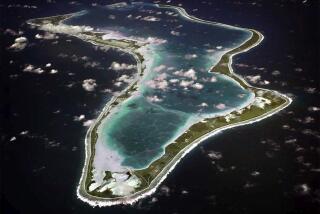British to Open Base in Afghanistan’s Lawless North
- Share via
KABUL, Afghanistan — Signaling its ongoing commitment to this still unstable country, Britain said Tuesday that it will open a small military base in northern Afghanistan this summer in hopes of quelling the sporadic violence buffeting the region.
The British Embassy said plans for the base of up to 70 soldiers call for it to exert a “calming influence” in the vicinity of Mazar-i-Sharif. The embassy’s confirmation of the plan came on the same day that an Afghan commander and two bodyguards were killed in an ambush near the city.
The killings were the latest eruption of violence between rival militia factions in the north that last week claimed 17 lives and raised fears that the fragile truce between commanders who joined forces with the United States to defeat the Taliban regime in the fall of 2001 may be disintegrating.
Violence has broken out recently in other outlying regions of this country where the authority of President Hamid Karzai is tenuous at best. Southern and southeastern provinces also have been rocked by grenade and missile attacks caused by suspected remnants of the Taliban and Al Qaeda, spurred possibly by the war in Iraq and by one renegade commander’s call for holy war against foreigners.
Kabul, the capital, is kept calm by a 4,700-strong international peacekeeping force. Since Britain’s forces contributed to the war to oust the Taliban, its military presence has been mainly limited to those peacekeeping forces in the capital.
In an interview, Ronald Nash, Britain’s ambassador to Afghanistan, told The Times that the British will field a so-called provincial reconstruction team, the term used by the U.S. Army for three such mini-bases it has opened since December in Gardez, Bamian and Kunduz.
The American bases combine directing civil assistance projects, such as the creation of schools and wells, with an effort to provide a security umbrella in areas where nongovernmental donor agencies may have been reluctant to operate. The U.S. military hopes to have eight of the mini-bases operating in Afghanistan by the end of the year, and it has expressed hopes that some of those could be run by the British or other members of the international coalition in Afghanistan.
But British officials here say their base, unlike the U.S. ones, will focus more on security and less on infrastructure projects that nonmilitary organizations could undertake. The former could include training police in the Mazar area, which is especially lawless.
“The core underlying intention of it is to try and help make the provincial area more secure so that reconstruction work can go ahead,” Nash said. The British government has not officially authorized the base, Nash said, but “has internally made the decision to deploy in Mazar.”
British forces, who will at some point be joined by those of other coalition nations, will also take an active peacekeeping role, possibly including escorting U.N. officials as they attempt to disarm militia forces and mediate violent disputes, Nash said.
Since the U.S. Army announced the concept in December, the mini-bases have been criticized by some aid agencies, including Care International, that maintain they blur the line between military and nonmilitary activities. The agencies say that creates a potential hazard for aid workers, who rely on their nonbelligerent status to function freely.
“We recognize there is a great security vacuum in the country ... but we are not in favor of the military taking on a developmental function. Soldiers don’t have the background in rural development, cultural sensitivities or in doing assessments of community needs,” Care’s country director in Afghanistan, Paul Barker, said Tuesday.
But the recent surge in violence in Afghanistan, including the killing of a worker from the International Committee of the Red Cross near the southern city of Kandahar on March 27, has caused some critics of the mini-bases to reconsider.
The warring parties in northern Afghanistan include fighters loyal to Uzbek warlord Abdul Rashid Dostum of the Junbish faction and his Tajik rival, Ustad Atta of Jamiat-i-Islami. The commander killed Tuesday was loyal to Dostum.
Complicating matters is the fact that both men are members of the central government who command their militias under the aegis of the national department of defense. But ever since the defeat of the Taliban, the warlords have clashed over a variety of issues, from control of customs duties and police forces to water rights.
Ostensibly, the Dostum and Atta militias will be disarmed and replaced over the next few years by the new national army with the help of a U.N.-sponsored disarmament program.
Until Tuesday’s ambush, the factional fighting that erupted last week seemed to have died down, thanks partly to a weekend truce brokered by the U.N. The battles took place in and around Meymaneh, the capital of Faryab province, west of Mazar-i-Sharif. The dead last week included one of Atta’s commanders and two civilians.
Reuters news service reported that Shahi, the commander of 300 militiamen who fought under Dostum for 15 years, was driving 18 miles west of Mazar on Tuesday when he and his bodyguards were ambushed.
The identity of those responsible for the attack was unclear.
More to Read
Sign up for Essential California
The most important California stories and recommendations in your inbox every morning.
You may occasionally receive promotional content from the Los Angeles Times.












